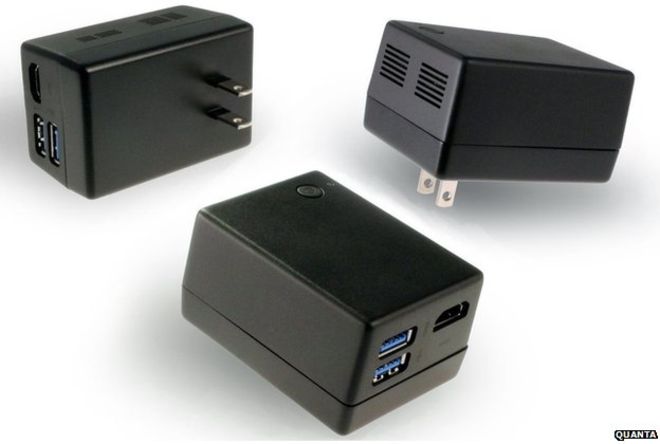A Taiwanese company has created a plug-like computer capable of running Microsoft's forthcoming Windows 10 operating system.
Quanta's Compute Plug is designed to be pushed directly into a power socket, has an HDMI port for TV connections and two USB sockets.
It is not the first such device. US chipmaker Marvell has promoted a range of similarly formed PCs since 2009.
But they are designed to work with the less processor-intensive Ubuntu OS.
To date, Marvell's "plug computers" ecosystem - which is targeted at schools and smart home enthusiasts - has had only niche appeal.
Fingerprint PC
Microsoft announced details about the new wi-fi enabled Windows device on its blog, indicating that it was designed to be cable-linked to a screen to turn it into a voice-controlled portable computer.
"The new Compute plug from Quanta is a mini PC and power adapter in one that can be plugged into any outlet and connected to a TV to turn it into a smart computer that can be controlled using Cortana via a Bluetooth remote or headset," it said.
The software-maker also showed off another unusual device made by Foxconn - a Taiwanese company which is best known for assembling other company's products.
The Kangaroo fits a Windows 10-powered PC into a box that resembles a portable hard disk drive fitted with a fingerprint reader on top. It also features a battery said to be capable of lasting six hours between charges.
Microsoft describes it as an "ultra-portable" computer that "can turn a TV into a full Windows 10 PC".
The US firm was unable to provide pricing or launch dates for the equipment, which it announced to coincide with the Computex trade show.
That casts a question mark over how widely they will be offered for sale.
But one analyst suggested they were a taste of things to come.
"Foxconn, Microsoft and Quanta aren't boasting about computing power with these devices - that's not the point," commented Peter Bryer from the consultancy CCS Insight.
"It's a matter of utility, enabling users to have specialised PCs scattered throughout the house.
"Windows 10 supports a wider set of devices, providing Microsoft with the flexibility to compete against more new shapes and sizes."
'Luggables to pluggables'
The new Windows OS is released as a completed build on 29 July, and will be free to existing Windows users and $119 (£78) to others for the basic version.
Based on the evidence of preview versions made available to for the public to test, some experts have suggested it might be a "buggy" experience, at least at first.
But those wishing to try out a tiny computer can already do so with other products already on the market.
Intel released its Compute Stick in April - an HDMI dongle that turns TVs into computers, which has both a USB port and an in-built MicroSD card reader.
It is sold pre-installed with a choice of either Windows 8.1 or Ubuntu.
Reviews, however, have complained that is is under-powered and "feels more like a proof-of-concept than a consumer device".
(BBC)
www.ann.az
Follow us !











